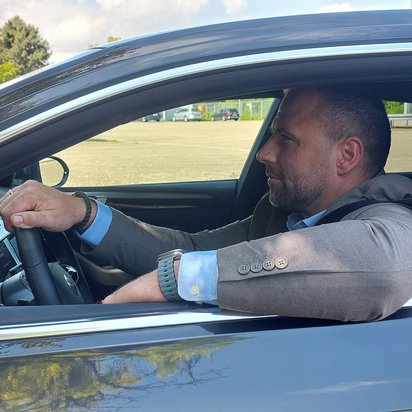How power poses work
Slack or upright: our posture influences how we feel and behave - even behind the wheel.

Slack or upright: our posture influences how we feel and behave - even behind the wheel.

When driving, many people don't take the rules very seriously. Most people are probably not aware of one of the possible causes: behavior at the wheel could be related to posture. This is indicated by an astonishing observation: Cars with a large seating area parked incorrectly more often, a research team from TU Berlin and the University of Basel reported a few years ago. It is conceivable that large cars do not find a parking space as easily or that it is not the space behind the wheel but the size of the vehicle that encourages drivers to claim special parking rights. However, the three psychologists were able to rule out these explanations. It remained the same: more seating space went hand in hand with more rule violations.
Researchers from renowned US universities such as Harvard University have confirmed this. They had around 70 students race in a driving simulator - under two different conditions: Some sat cramped, others were able to stretch their arms and legs comfortably. All were promised a ten-dollar reward if they managed to cover the specified distance in five minutes. The result: those sitting in a cramped position had an average of four accidents, while those with plenty of space had around seven accidents. The latter also ignored the rules of the game more than twice as often: After an accident, they drove on even though they were supposed to wait a while. Those with space were therefore more likely to behave in a risky or antisocial manner.
This could be due to a phenomenon that experts call “embodied cognition”. The basic idea behind it: “Mental processes are anchored in the body and are also influenced by it,” explains Dennis Dal Mas from the Medical-Psychological Institute of TÜV NORD in Bielefeld.

Experiments back in the 1980s showed that: People feel more helpless and stressed in a bent posture than in an open, upright posture. The head and upper body are apparently particularly important for the psyche. This is suggested by a study from Japan in which test subjects were put into various poses under a pretext. A straight back evoked positive feelings, a bent back or a lowered head negative feelings - and even a wide stance did nothing to change this.
So-called power poses were examined particularly often: expansive positions such as hands clasped behind the head or sitting with legs apart. Such postures can trigger thoughts and feelings that are associated with a high social status, as a meta-analysis of more than 100 experiments by the University of Bamberg suggests. According to the study, an upright posture increases self-confidence and expansive poses evoke feelings of power and dominance.
However, social conventions have a say in this. “A power pose only works if it doesn't violate social norms,” reports Dennis Dal Mas from TÜV NORD. Putting your feet on the table is considered rude or at least inappropriate in many situations. In one experiment, for example, only test subjects from the USA felt more powerful in this position, but not test subjects of Asian origin - presumably because their culture forbids such a posture.
“A power pose is always a double-edged sword,” says Dal Mas. If you want to make a good impression, an upright posture is therefore the better choice. A British study had photos of the same men and women in different poses assessed and found that male power poses were rated as the most self-confident. However, both the women and men appeared more professional and friendly in an upright pose. The TÜV NORD psychologist recommends: “Just sit up straight and you'll be fine at the wheel.”
Founded over 150 years ago, we stand for security and trust worldwide. As a knowledge company, we have our sights firmly set on the digital future. Whether engineers, IT security experts or specialists for the mobility of the future: in more than 100 countries, we ensure that our customers become even more successful in the networked world.